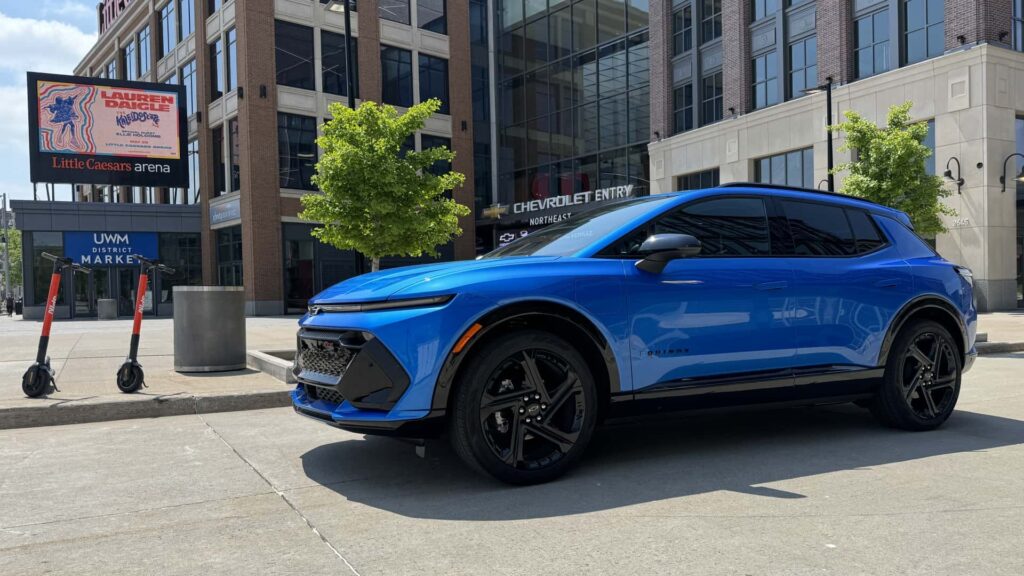Forget the $100,000 spaceships. What the world needs most now is affordable electric cars. And after plenty of setbacks on the electric front, General Motors thinks it’s found the secret sauce in the now-on-sale 2024 Chevrolet Equinox EV, as executives and engineers put it.
The crossover boasts 319 miles of range in front-wheel-drive 2LT form, which starts at $43,295 (excluding destination) before the $7,500 EV tax credit gets factored in. Later this year, the base Equinox EV LT will debut at just $34,995 before any tax credits and with the same impressive range.
The battle for affordable EVs
More and more automakers are rushing to sell EVs priced around $35,000 or less, including Kia, Chevrolet and possibly Tesla sometime in the near future. It’s seen as the next great growth front in the electric space.
In other words, GM just unveiled the cheapest new way to get more than 300 miles of electric range in America, since a 2LT will be in the mid-$30,000 range after tax credits and the LT will go even lower than that. (Opting for all-wheel drive cuts range to a still-not-bad 285 miles across the lineup.) After years of having to pay hefty premiums for decent range, the Equinox EV seems poised to take long-range EVs more mainstream—especially as a crossover, which American buyers love.
“We really do believe that this is the one that’s going to crack the code and allow us to bring EVs to Main Street,” Brad Franz, Chevy’s crossover marketing director, said at the Equinox EV’s media preview in Detroit this week. “It’s not just about expensive vehicles anymore.”
Until the revamped Chevy Bolt makes its return, the Equinox is the least expensive Ultium EV you can get. It undercuts its larger cousin, the Blazer EV, by around $10,000 or more, and comes in far lower than the $94,500 Silverado EV RST First Edition that journalists also drove in Detroit this week.
Still, the Equinox EV has a lot in common with those cars. And that’s how GM kept its price so low.
“Because we developed this as an architecture upfront across many brands, you get scale,” Matthew Purdy, the executive chief engineer for GM’s battery-powered SUVs, told InsideEVs. “It uses the same front motor as the [Cadillac] Lyriq, Blazer, Equinox and [Cadillac] Optiq. You’ll see that same 17-inch display across the Silverados, the Blazers.”
Purdy added that the Equinox shares many other components with those cars, including their steering wheels, new Android Automotive-based operating system and, of course, the Ultium battery in the floor.
“It’s one thing when you purchase in low volumes. Your costs tend to go up quite a bit, as well as your development costs,” Purdy said. “But once you start to scale that across many different cars in the family, then you can start to take advantage of [economies of scale].”

This was always the plan for GM’s Ultium platform: Build an entire family of future EVs, even ones sold in China or for other brands like Cadillac, on one common architecture. The modular battery packs are designed to have energy ranges from 50 kWh to more than 200 kWh, like the GMC Hummer EV and Silverado EV, and the platform can be front-wheel-drive, rear-wheel-drive or all-wheel-drive.

Unfortunately for GM, that scalable EV platform dream turned into a nightmare last year, as the automaker struggled with software bugs and the automated production of its battery packs. In the months since, GM executives—including new hires from the tech space—have said the company is working past its issues to make 2024 a kind of comeback year on the electric front. While that unfortunately coincides with a slowdown in the rate of EV adoption globally, electric sales remain the fastest-growing automotive sector, and GM hopes the more affordable Equinox EV will convince people to make the jump.
The Equinox EV cuts down on costs in other areas as well. Unlike the pricier Silverado EV, which can undertake DC fast charging at speeds north of 350 kW, the Equinox EV maxes out at 150 kW. While that isn’t as fast as some rivals out there, such as the Tesla Model Y or Hyundai Ioniq 5, it can still add an estimated 77 miles of range in 10 minutes, according to GM estimates. The automaker says that should help families get back on the road during trips more quickly than they think. Having a less cutting-edge electric architecture kept costs in check, Purdy said. Additionally, bi-directional charging—the ability to power other high-powered electrical devices using the car’s battery—is only optional on the top-trim 3RS model.



But what’s interesting is that while the Equinox EV is more affordable than some of its GM relatives, it doesn’t feel de-contented, even compared to the more expensive Blazer EV. It still offers Super Cruise hands-free automated driving assistance system, robust Google Assistant voice controls, automatic liftgate opening and many other tech features.
Purdy added that the decision to make the Equinox EV FWD or AWD spoke to what crossover customers are used to, especially in more snow-heavy states. “Of course, one could argue for a rear-drive variant because these cars weigh more, so the weight distribution’s a little better,” he said. But going FWD was also tied to GM’s plans for scaling its electric motors across the Ultium lineup, he said.
Like several of GM’s other electric cars, the Equinox EV won’t replace the mechanically unrelated gas version, which is all-new for 2025. That continues to be a top-selling crossover for GM, with over 212,000 sales last year. But Purdy hopes the EV variant is familiar enough, and a strong enough deal, that it may convert some of those customers and bring in new ones too.
“It’s not a science project,” Purdy said. “We wanted people who are used to the Equinox to hop in this and go, ‘Oh hey, this is an Equinox.’ And it just happens to have an EV propulsion system.”
Contact the author: patrick.george@insideevs.com

